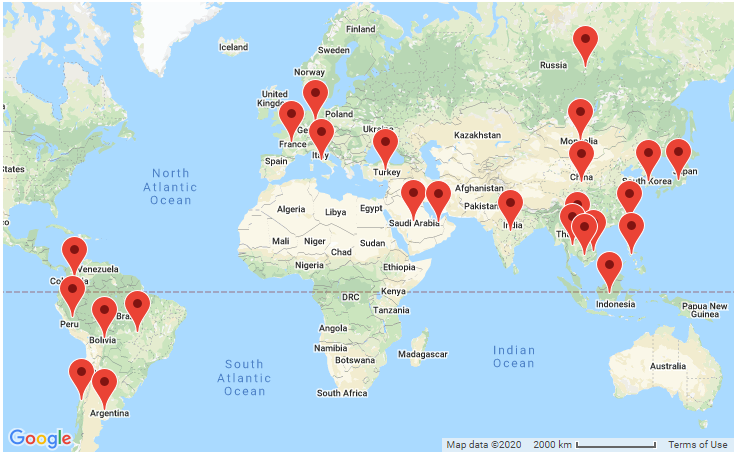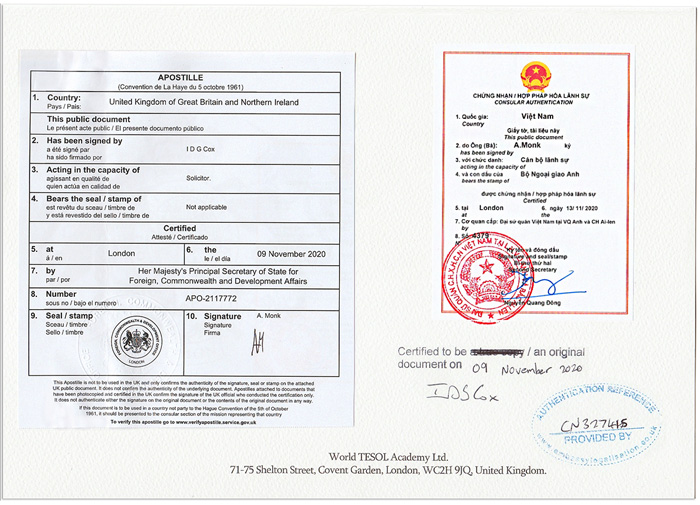
Making the leap from online teaching to teaching English abroad
Teaching English online has been growing in popularity over the past 5 years. Now, with the chaos caused by the COVID-19 pandemic, it has become even more popular.
However you got into it, if you teach English online, you can leverage the skills and experience you acquire to launch a career as a classroom teacher overseas.
When you teach English online, you’ll build up a range of valuable skills and experience. You can use these to explore other careers online – such as a copywriter, journalist, or producer of ESL materials. However, you don’t need to be limited to only working online. Many of the skills you learn are transferable and can help you to transition towards classroom teaching – whether in your home country or overseas.
Valuable skills you learn from teaching online:
How to build rapport with students – this is one of the biggest challenges for teachers. You need to know how to actually engage with your students in a way that they respond well to. Through your online lessons, you’ll have learned many micro-skills that can help you to do this. These usually involve the way you speak to your students – tone, pace, choice of words, choice of topics.
How to motivate students – you’ll know how to spot when students are feeling demotivated, and will have practiced giving rewards and incentives to help raise their motivation levels. Motivating students through a webcam is a difficult task – so if you can do it online then you’ll have no trouble doing it in person.
Handling mixed-level classes – many online teaching platforms involve teaching 2-4 students (or even more) in a single online class. While the companies will try to group these students into similar skill levels, if you’ve had experience with these classes you’ll know that it’s common to have students of very different skill levels grouped together. This is something that you’ll also see in traditional physical classrooms, especially in public school systems.
Keeping parents happy – online teaching platforms usually have quite strong feedback systems in place, where students will need to rate teachers after each lesson. These are crucial to help encourage parents to continue using the platform and paying for lessons. As such, you’ll have learned ways to encourage your students to give good feedback for your lessons – and to let this echo up to their parents.
With online teaching, you’ll also often have much more direct contact with the parents of your students. Many parents will sit directly next to their children and might even directly talk with you before/after/during lessons. From these interactions, you’ll be able to learn what behaviors parents approve of, and what they wish to limit. It’s this kind of insight that can be very useful for physical classrooms too – especially with private language schools.
Using school materials – many new teachers aren’t familiar with the process of learning your school’s materials and then being able to teach them effectively in your lessons. When teaching online, you’ll often have a range of pre-made lessons which you’ll teach to your students. It’ll be your responsibility to preview these lesson plans and think of ways how you might be able to bring them to life (props, gestures, etc.). Many new teachers struggle with this, either not preparing well enough before lessons, or not being able to squeeze enough fun out of their schoolbooks.
While you might not be aware of it, there are actually a lot of advantages that can gain from teaching online before teaching overseas. Based on these skills and your teaching experience, if you prepare well, then you should be able to make an easier transition into classroom teaching.
With that in mind, it’s a good idea to start preparing how to make the jump.
Preparing for the move:
Before you start looking for flights and packing your bags, there are a few things you should do if your goal is to teach abroad.
Research different destinations carefully
The idea of spinning the globe and choosing a random country could be quite exciting, but in reality, it’s actually very important to put some time into researching different destinations. There are so many options out there, but there are definitely some countries that have more of an infrastructure for TEFL tutors in place.
Here are some of the most popular countries to teach English in:

These include countries like Japan, China, Taiwan, Vietnam, Thailand, Spain, Korea, Russia, Italy, Poland, Argentina, Peru, and many more.
It’s important to take some time to research these different countries (and any others that you might be interested in). You should look at their culture, check their employment laws regarding foreign workers (especially requirements for English language teachers), research their current job market, and find out how they prefer to hire (is it online or face to face).
If the country seems like it’s a good fit for you, and if you meet the legal requirements to teach there (do they require a degree to get a work permit, do they restrict ESL teaching jobs to people from certain countries, etc.), then you could start to research where specifically in the country you’d like to live and work.
Ensure you have sufficient training
Many people teach English casually online without having gone through formal teacher training. If you’re hoping to travel overseas and teach English in person, you’ll certainly need to make sure that you’ve been through a thorough TESOL/TEFL course. Many TESOL/TEFL courses focus on fringe topics and don’t actually give you insight into the types of techniques you’ll need to use in an actual classroom.
Getting your TESOL/TEFL certificate:
If you haven’t yet enrolled in an accredited TESOL/TEFL course you can do so with the button below. Our 120-hour course can be completed online at your own pace, and covers both online and in-person teaching techniques:
.
You might to also want to consider purchasing a hard copy of your TESOL/TEFL certificate, as when applying for positions in physical schools (rather than virtual online schools), a hard copy of your certificate can help to make a better impression.

It’s also important to know if your TESOL/TEFL certificate can be authenticated for use overseas. In certain countries, most notably – China and Vietnam, education certificates (degrees, TESOL/TEFL certificates, etc.) need to go through a legalization process and then a formal government attestation process. Many certificates can’t make it through such processes.
Prepare a new resume for in-class positions
It may sound obvious, but if you are going to apply to teaching jobs abroad, you’ll certainly need to have your CV in order. This would usually mean making a new resume written specifically to connect with in-class recruiters, schools, and agencies. Everything you put in this resume should help to signal how ready you are to teach in a physical classroom.
As an online tutor, one of the things you should have in your favor is plenty of teaching experience, which will reflect well on you.
However, it’s important to keep in mind that while online teaching experience is very valuable, recruiters/schools might not consider it to be as valuable as in-class teaching experience. This means that when preparing your resume, you should make sure to communicate exactly how valuable your teaching experience is. It could help to highlight the points mentioned at the start of this article.
Before you start writing your resume, you should also make sure to check out our ultimate resume guide for English teachers.
Find which types of classes you want to teach
With online teaching, you’ll probably be aware of the different types of platforms and various student groups. There are those which focus on helping young learners master the basics of the English language. Some platforms focus on helping middle/high school students to further their language skills. Other platforms aim to help teens prepare for language proficiency exams, as well as helping adults to master using English in a business context.
Similarly, with classroom teaching, there are also many different types of classes – some of which you might really enjoy teaching, and some which you might not enjoy. To give you an idea of what might be a good fit for you, here are some of the jobs you can run into according to student age groups.
Different class types that you might come across:
Pre-school: If you have a soft spot for the youngest age groups, becoming a pre-school teacher is your best bet. This is a great opportunity to have a huge impact on young lives, if you can handle the chaos of the classroom.
Children: The majority of people who teach English abroad opt to work in primary schools, and work with children.
If you have aspirations of becoming a primary school teacher and you want to be able to have conversations with the students about their hopes and dreams, this is a great age group to target.
Teenagers: While they can be an unruly bunch, teenagers can also be some of the brightest young people you’ll encounter.
Working in a secondary school abroad is a good option if you relish the challenge of teaching complex ideas to young minds, and setting them up for future success with English proficiency.
Adults: There are many ways to teach adults, from private academies to community centers.
Teaching adults can be very rewarding, though at times also frustrating if their English level is minimal since you might expect them to be conversationally fluent. If you are going to teach adults abroad, it’s a good idea to brush up on their native language so you can help them out when necessary.
Increase your employability with a TEYL certificate:
Build on your TESOL/TEFL skills with extra TEYL training for teaching English to young learners.
As young learners make up the majority of online English classes, it can help to more deeply understand how to teach them.
.
Aside from these different age ranges, you could also narrow your search down further – looking at whether you’d prefer to teach for short periods in summer camps, in public schools with regular hours, or in private language centers with flexible hours.
If you follow the advice above, you should set yourself up well for transitioning from online teaching to in-class teaching. It takes some time to research and prepare, but you’ll have experience which should give you a strong advantage over others.




Leave A Comment